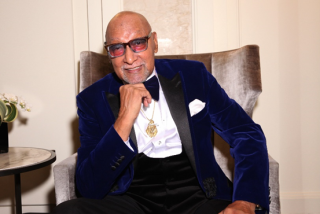Al Hibbler; Distinctive Jazz Singer With Ellington Band
- Share via
Al Hibbler, a singer with an idiosyncratic baritone style known for his work with the Duke Ellington Orchestra in the 1940s and early ‘50s, has died. He was 85.
Hibbler died Tuesday at Holy Cross Hospital in Chicago, the city he had lived in for many years.
A versatile singer who could handle ballads, standards and, at times, an earthy blues number, Hibbler also used a style that Ellington called “tonal pantomime.” In this style, Hibbler affected a Cockney accent, which he would often punctuate with odd tonal distortions and growls.
And while tonal pantomime was popular with audiences, Leonard Feather expressed the view of many jazz critics that the affectation did little to enhance Hibbler’s ability to sing a first-rate blues song or a vibrant unmannered ballad.
Born in Little Rock, Ark., and blind from birth, Hibbler attended the Conservatory for the Blind in his hometown and sang in the school’s choir.
After winning an amateur talent contest in Memphis, Hibbler started his own band in San Antonio before joining Jay McShann’s big band in 1942. A year later, Hibbler started an eight-year association with Ellington. During the Ellington years, he won the Downbeat magazine award as best band vocalist and the New Star Award from Esquire magazine.
Appearing on several Ellington recordings, he was known for his renditions of songs such as “Do Nothing Till You Hear From Me” and “I’m Just a Lucky So and So.”
Hibbler left the Ellington organization in 1951 in an apparent dispute over his desire to freelance. He went on to record with Ellington’s son, Mercer, as well as with Billy Taylor, Count Basie, Gerald Wilson and Rahsaan Roland Kirk.
His versions of “The Very Thought of You,” “Stardust” and “Unchained Melody” became popular favorites, with “Unchained Melody” hitting No. 3 on the record charts.
In the early 1960s, Hibbler was one of the first artists signed by Frank Sinatra to record on his new label, Reprise.
Active in the civil rights movement, Hibbler led demonstrators in desegregation marches in 1963 in downtown Birmingham, Ala. But while others in the protest march were jailed by the city’s public safety commissioner, Eugene “Bull” Conner, Hibbler was detained briefly and released because he was blind.
Hibbler was disappointed at the police response, saying: “I went downtown simply to be arrested, but they even segregated me. . . . That is segregation at its highest level.”
In 1971, Hibbler performed “When the Saints Go Marching In” at the funeral of jazz trumpeter Louis Armstrong.
Hibbler is survived by a brother, Hubert, and a sister, Christine, both of Chicago.
More to Read
The biggest entertainment stories
Get our big stories about Hollywood, film, television, music, arts, culture and more right in your inbox as soon as they publish.
You may occasionally receive promotional content from the Los Angeles Times.










